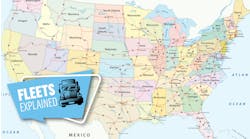The Federal Motor Carrier Safety Administration is planning to expand the number of crash types considered not preventable in the Crash Preventability Determination Program (CPDP), which would allow carriers to have a broader range of non-preventable accidents leave CSA scores unaffected, according to a Federal Register notice. Additionally, the descriptions of existing eligible crash types are being reworded to "allow more crashes to be submitted for consideration in the program," according to the notice.
Since May 2020, the CPDP has allowed carriers or drivers involved in specific crash types to submit Requests for Data Review (RDRs) through FMCSA’s DataQs system. FMCSA reviews the RDRs and attached police reports to determine if a crash was preventable or not, determining whether the event affects a carrier’s CSA score.
FMCSA has opened comments on its proposed CPDP revisions until June 12, 2023.
In its current state, the CPDP accepts 16 specific crash types as eligible for preventability consideration. FMCSA is considering adding the following four crash types to the list:
- The commercial motor vehicle was struck on the side by a motorist operating in the same direction. Currently, the crash type is limited to side strikes at the very rear of the vehicle ( e.g., 5:00 and 7:00 points of impact)
- The CMV was struck because another motorist was entering the roadway from a private driveway or parking lot
- The CMV was struck because another motorist lost control of their vehicle. FMCSA reviewed many PARs that included this information but were ineligible for the program under the current crash types.
- Any other type of crash otherwise standing outside the CPDP categories if there is video attached depicting the sequence of events.
See also: FMCSA proposes long-awaited changes to CSA, eliminates IRT
The new crash types would not be retroactive, meaning when FMCSA updates its DataQs system to include new types—a date for which has not yet been determined—a crash occurring before the start date of the new crash types would not become eligible for CPDP submission.
For any of the CPDP-eligible crash types, FMCSA would still display crashes in the SMS, noting whether the crash was preventable or not preventable. If there is not sufficient evidence to make a determination, the crash would be classified as “undecided.” Crashes classified as not-preventable, however, would not be used in the BASIC calculation for CSA scores. FMCSA would also note not preventable determinations in the Pre-Employment Screening Program (PSP) for five years.
As of Dec. 30, 2022, 7,669 carriers had submitted RDRs. Of these, 3,138 carriers submitted 1 RDR, 3,837 carriers submitted between 2 and 9 RDRs, and 694 carriers submitted 10 or more RDRs. The highest number of RDRs submitted by 1 carrier was 942 RDRs.
A sigh of relief for carriers with preventable accidentsFederal Register comments as of April 14, 2023 were largely positive.
Brandon Wiseman, a transportation lawyer who is the president of Trucksafe Consulting, wrote in a blog post that the changes would potentially have a positive impact on the carriers’ SMS scores, saying that "this change will likely be viewed by the industry as a positive one."
One commenter stated, "This is much needed. Carriers experience many crashes that currently are eligible to reviewed for removal" and that CSA scores currently "negatively impact our pricing for insurance coverage and are often used against carriers in court even when they are inflated by non-preventable accidents."
A comment from Stockton, California-based bulk carrier Fuel Delivery Services expressed that the commenter was "excited to see all the new categories to be added." The commenter also wrote that it will allow a more accurate crash risk for the company to be available to its customers and the public.
There was, however, measured criticism of the RDR reviewal process and the FMCSA's DataQs system. One comment stated it would be helpful if RDRs could be expedited, saying, "Currently, it is not uncommon to wait a long period of time before a determination is made," meaning the carrier must deal with a worse safety score in while waiting for a determination. The commenter said a suspension of the points until a determination is made or a quicker determination would be helpful.
Another commenter suggested that, if CPDP allows video, the DataQs system should be upgraded to allow for larger videos to be uploaded.





